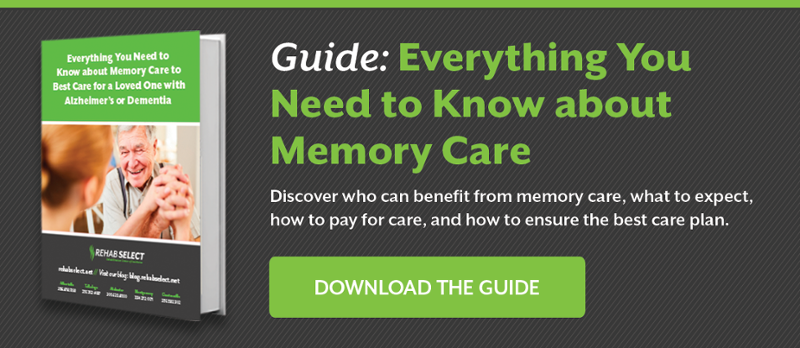
Here are some commonly asked questions about the cost of dementia care and how you can get assistance through Medicaid and Medicare.
Download our ebook to learn the most important factors when considering memory care services for your loved one with Alzheimer’s or dementia.
What's the cost of memory care facilities near me?
The cost of dementia care varies. It depends on the stage and progression of the individual’s condition and the level of care required. It's also affected by the patient’s preferences plus the family’s financial, emotional and time resources.
The average cost for memory care facilities in the U.S. is $6,935 per month, which is more than the average cost of assisted living ($5,380) but much less than a nursing home ($10,562.) It also varies by state, ranging from $3,800 in Hawaii to more than $7,000 in Vermont. Here in Alabama, the monthly median cost is around $4,330.
The fee charged by a memory care facility typically covers housing, meals, memory-enhancing therapies and 24-hour care. On top of that, you'll need to account for the cost of medication, which will depend on the patient's health conditions.
Does Medicaid or Medicare cover memory care?
Medicaid and Medicare are basic insurance programs. They generally will cover room and board in certified long-term care facilities and nursing homes as well as medical expenses.
Coverage varies by state. For example, there's no general assistance Medicaid program in Alabama. Patients must meet specific criteria to be eligible. States with better-funded programs may offer more extensive coverage.
The amount you pay will depend on your Medicaid program, and your provider can help check for coverage. These programs won't pay for everything, and most families will have to pay a certain amount out of pocket.
Like other insurance programs, Medicaid and Medicare have preset rates for services and treatments. The payment amount for a specific facility depends on the services and amenities available.
How can I reduce the cost of memory care?
The cost of memory care depends on the different levels of care and privacy a patient requires. You should also understand the type of assistance you can get from your state.
Here in Alabama, Medicaid's Home and Community-based Waiver Services help pay for a sitter or other personnel to go to a patient's home to assist with daily living activities such as cooking, bathing and administering medication. A patient can go to a nursing home if they need long-term care (i.e., 30 days or more) at the institutional level, and Medicaid will provide assistance.
Note that assistance is available for home care or a nursing home but not for assisted living.
Veteran’s resources and disability support may also be paths to consider for support, depending on the individual.
Another tip to reduce the cost of care is to take the "preemptive strike"—people who visit their doctors regularly tend to get diagnosed earlier. They have more time to weigh their options, manage the progression of their conditions and find a long-term solution that meets their needs.
How can you decide on the level of memory care needed at different stages of dementia?
The cost of memory care depends on the patient's condition. At the earlier stages, they probably have good days and bad days. They would be functional on good ones and forget minor things (e.g., childhood events) on bad ones. They can stay at home with the help of a caregiver to get through the more challenging days.
When a patient starts wandering and losing the cognitive functions to perform basic daily living activities, it's time for more advanced and hands-on care that a caregiver may not be able to provide at home.
At the advanced stages of dementia, patients often lose some bodily functioning (e.g., swallowing) The condition requires too much attention for caregivers to handle at home and using a memory care facility is often the best option for both the patient and their loved ones.
The Cost-Benefit Analysis of Memory Care: Putting Things into Perspective
When considering dementia care, you must address the direct and hidden costs. While the average cost for memory care facilities may seem high, giving loved ones the proper level of care can result in the best outcomes for patients and their families.
Understandably, many people want to keep their loved ones at home for as long as possible, from both financial and emotional perspectives. However, as the disease progresses, the burden on the caregiver will increase exponentially. Meanwhile, the patient is more likely to endanger themselves.
Families must look beyond the monetary cost of memory care and factor in the stress on the caregiver and the patient's safety.
For example, consider the number of hours caregivers spend on providing unpaid assistance to a loved one and the resulting loss of income, as well as the emotional stress they experience. If you exhibit signs of depression, which is not unusual for many caregivers, it's time to get help.
Unfortunately, many families let emotions drive their treatment decisions. It's not uncommon for people to overestimate their availability and capability to care for a loved one and underestimate the level of time and emotional investment required from caregivers. Make your decision to ensure that the patient gets the best care and not based on sentiment and convenience.
Also know as you conduct financial planning for care services that some facilities, such as Alabama-based Rehab Select, have representatives who can help.
Finding Memory Care Facilities Near Me That Accept Medicare and Medicaid
Memory care facilities provide a safe, structured environment with set routines to lower stress for people with Alzheimer's or dementia. These patients typically have reduced risks of falls and injuries and experience improved wellness.
Rehab Select offers long-term memory care for patients in Alabama. Our welcoming environment and state-of-the-art safety features create a comforting experience for residents and their loved ones. Schedule a tour to see how our human-centered program and philosophy offers residents the emotional, mental and physical care to achieve the best outcomes. As you identify.




